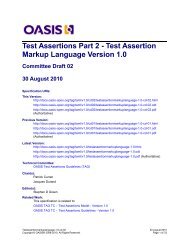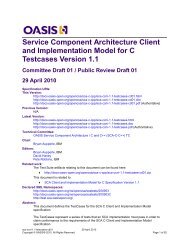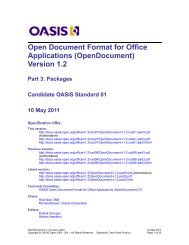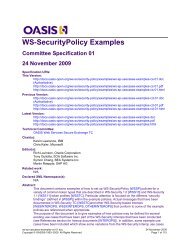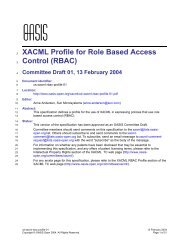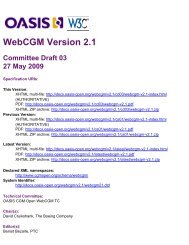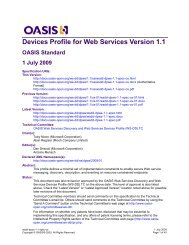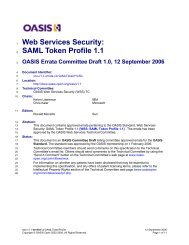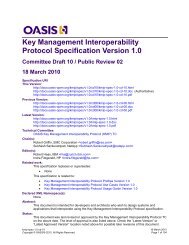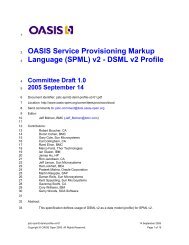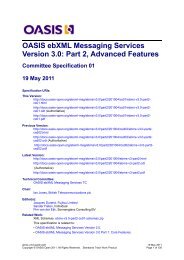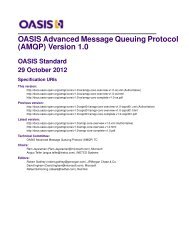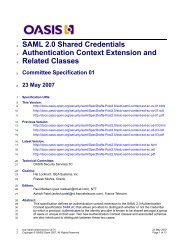Content Management Interoperability Services (CMIS) Version 1.1
Content Management Interoperability Services (CMIS) Version 1.1
Content Management Interoperability Services (CMIS) Version 1.1
Create successful ePaper yourself
Turn your PDF publications into a flip-book with our unique Google optimized e-Paper software.
2.<strong>1.1</strong>0 Object-Type Creation, Modification and Deletion<br />
A repository MAY support the creation, modification and deletion of primary and secondary object-types.<br />
Each object-type definition SHOULD include a set of flags that indicate if the object-type can be used as a<br />
parent type or if the object-type can be modified or deleted. Please see section 2.1.3.2.1 Attributes common<br />
to ALL Object-Type Definitions for details.<br />
These flags are not to be interpreted as the rights for the current user. These are the rights that would<br />
apply to an administrator user or a user that has sufficient rights to modify metadata. For example, a nonadministrator<br />
would see that an object-type is extendable (the type mutability capabilities create flag is set<br />
to TRUE) even though they would not be allowed to actually perform the operation. If a user tries to create,<br />
modify or delete a type definition and does not have the required permissions, the repository MUST return<br />
a permissionDenied error.<br />
A repository MAY also place additional restrictions on these operations where necessary. These restrictions<br />
are repository specific.<br />
2.<strong>1.1</strong>0.1 General Constraints on Metadata Changes<br />
The optional capabilities capabilityNewTypeSettableAttributes and capabilityCreatablePropertyTypes<br />
SHOULD indicate which object-type attributes can be set by a client and which<br />
properties data types can be used to create or extend an object-type.<br />
Note, that the client CANNOT define whether a new object-type can be used as a parent type, or can be<br />
updated or deleted. How the repository determines a given object-type's mutability capabilities is repository<br />
specific.<br />
When an object-type is created the client MUST suggest a type id for the new object-type. The repository<br />
may do the following with this suggested value:<br />
• Use it exactly as specified.<br />
e.g. input = invoice : returned value = invoice<br />
• Modify it with the addition of a prefix, suffix or both.<br />
e.g. input = invoice : returned value = invoice_FAF5D0C5-BBE9<br />
• Return a completely different value.<br />
e.g. input = invoice : returned value = FAF5D0C5-BBE9-4E47-BB17-C9FE63B4EE20<br />
When a property definition is created the client MUST suggest a property definition id for the new property.<br />
The repository may do the following with this suggested value:<br />
• Use it exactly as specified.<br />
e.g. input = amount : returned value = amount<br />
• Modify it with the addition of a prefix, suffix or both.<br />
e.g. input = amount: returned value = amount_12AB<br />
• Return a completely different value.<br />
e.g. input = amount: returned value = 12AB-23CD<br />
When an object-type is created or updated, the repository MUST return the created or updated type definition<br />
whereby the order of ALL newly created property definitions MUST match the order of the input. This is<br />
so that there will be no ambiguity for clients who need to know which property matches a specific suggested<br />
Id value for a new property definition. This special ordering is only required for the return value for createType<br />
and updateType. There is no special ordering of the properties returned for subsequent calls to<br />
getTypeDefinition for this new or modified type.<br />
When an object-type is updated the following rules MUST be obeyed:<br />
• Inherited properties MUST NOT be modified. This includes constraints of any kind.<br />
<strong>CMIS</strong>-v<strong>1.1</strong>-csprd01<br />
Standards Track Work Product<br />
Copyright © OASIS Open 2012. All Rights Reserved.<br />
18 August 2012<br />
Page 81 of 331



